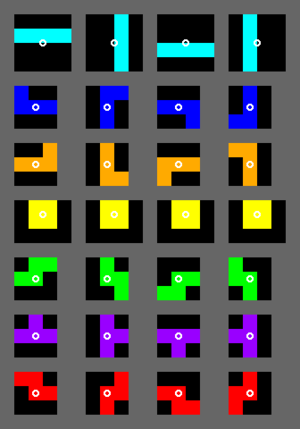User:Edo/SRS

Super Rotation System, or SRS is the current Tetris Guideline standard for how tetrominoes behave, defining where and how the tetrominoes spawn, how they rotate, and what wall kicks they may perform. SRS traces its routes back to 1991 when BPS introduced its signature third and fourth rotation states for the S, Z, and I tetrominoes in the game Tetris 2+Bombliss. Two years later, in the game Tetris Battle Gaiden, BPS altered the spawn orientation of the T, L, and J tetrominoes so that they spawned flat-side first. It was not until the 2001 game, Tetris Worlds, that the wall kick system was introduced, and SRS took its final form. Henk Rogers, in his effort to unify all new Tetris games into the Tetris Guideline, required Arika to include a form of SRS in their 2005 game, Tetris The Grand Master 3 Terror-Instinct, where it is called "World" rule, in reference to Tetris Worlds.
Basic Rotation
When unobstructed, the tetrominoes all appear to rotate purely about a point. It is a pure rotation in a mathematical sense, as opposed to the combination of rotation and translation found in other systems such as Sega Rotation and Atari Rotation.
All tetrominoes spawn wholly above the playfield and horizontally, with flat-side first in the case of J, L and T. The I and O tetrominoes spawn centrally, and the other, 3-cell wide tetrominoes spawn rounded to the left.
Wall Kicks
Wall kicks in SRS are extremely lenient compared to those of earlier games. Some rotations result in new positions that do not overlap the former position at all, allowing for highly controversial T-spin triples (see Twist). blah blah
How SRS Really Works
blah blah
20G
Since Henk Rogers has not been directly involved with a game boasting 20g aside from Tetris Zone, certain behaviors are likely undefined in the Tetris Guidelines. Tetris Worlds reaches only 2.36G. Minna no Soft Series: Tetris Advance was the first game to feature SRS and 20G. TGM3 and TGM ACE are the second and third, and Tetris DS (TDS) is the fourth. Though the rotations are identical, these games have different mobility restrictions due to their different order of processing events in between frames.
In this example, Left is being held and then a clockwise rotation is initiated.
|
|
The above example ends mid-frame... So the figure on the right is never actually rendered. It simply represents the internal game status after rotation has been processed.
Now, if the game processes movement followed by gravity, the following scenario will happen (as found in TGM3, TGMA and Tetris Zone).
|
|
On the other hand, if gravity is processed next, the following scenario will happen (as found in TDS). This could be the result of either movement processed after gravity, movement processed before rotation, or (most likely in the case of TDS) movement occurring one or more frames after both rotation and gravity due to slow DAS.
|
|
External links
- Tetris DS Systems Guide (link no longer works)
- Jagorochi's analysis of SRS wall kicks (web archive)